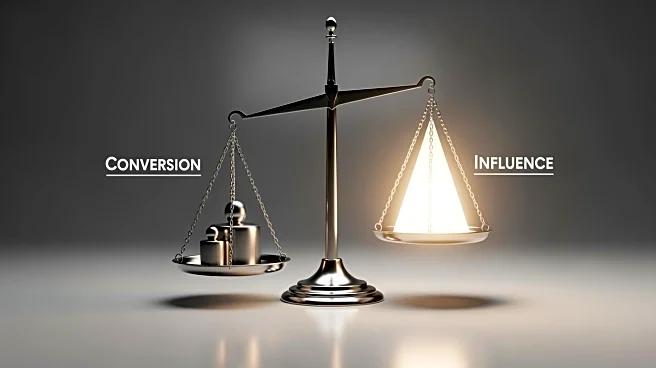What's Happening?
B2B marketers are increasingly prioritizing lead generation strategies that emphasize influence over mere conversion. According to Marketing Week's 2025 State of B2B Marketing research, seven in ten B2B marketers have
shifted their focus in the past three years. This change is evident across both small and large organizations, with 73% of marketers in SMEs and 70% in larger businesses reporting a shift. The evolution of lead generation tactics is moving away from traditional methods like cold calling and trade shows, towards more sophisticated, data-driven approaches. Companies like Canva are leading this transformation by integrating predictive insights and AI to personalize outreach and engage high-value accounts. The focus is on creating value throughout the customer journey, rather than just chasing volume at the top of the funnel.
Why It's Important?
This shift in B2B marketing strategies reflects a broader trend towards building deeper relationships with clients and enhancing brand trust. By moving from conversion-focused tactics to influence-driven strategies, marketers aim to become the 'first call' for clients when they are ready to make purchasing decisions. This approach aligns with the long-cycle nature of B2B industries, where buying decisions can take years. The emphasis on data storytelling and AI-driven insights allows marketers to engage clients more effectively, fostering long-term partnerships. As brands focus on creating genuine value and emotional connections, they are better positioned to navigate the complexities of modern marketing landscapes and drive sustainable growth.
What's Next?
The future of B2B marketing will likely see further integration of AI and data-driven strategies to enhance personalization and efficiency. As marketers continue to refine their approaches, the focus will be on nurturing relationships and aligning with client values. Companies may increasingly leverage social media and influencer marketing to expand their reach and engage diverse audiences. The ongoing evolution of lead generation tactics will require marketers to balance short-term performance with long-term brand building, ensuring they remain competitive in a rapidly changing market.
Beyond the Headlines
The shift from conversion to influence in B2B marketing highlights the growing importance of ethical and transparent practices. As marketers prioritize building trust and emotional connections, they must navigate the challenges of data privacy and ethical AI use. This transformation also underscores the need for continuous skill development and cross-functional collaboration within organizations, as marketing becomes a company-wide function rather than a siloed activity.











